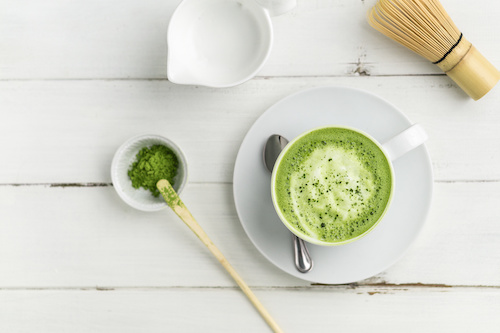The antioxidant, epigallocatechin gallate (EGCG), found in green tea may increase levels of p53, a natural anti-cancer protein, known as the “guardian of the genome.” The name is derived for the protein’s ability to repair DNA damage or destroy cancerous cells. Published in Nature Communications, the study directly links the interaction between p53 and EGCG and points to a new target for cancer therapy and drug discovery.

“Both p53 and EGCG molecules are extremely interesting. Mutations in p53 are found in over 50% of human cancer, while EGCG is the major anti-oxidant in green tea, a popular beverage worldwide,” said Chunyu Wang, corresponding author and a professor of biological sciences at Rensselaer Polytechnic Institute. “Now we find that there is a previously unknown, direct interaction between the two, which points to a new path for developing anti-cancer drugs. Our work helps to explain how EGCG is able to boost p53’s anti-cancer activity, opening the door to developing drugs with EGCG-like compounds.”
Wang, a member of the Rensselaer Center for Biotechnology and Interdisciplinary Studies, is an expert in using nuclear magnetic resonance spectroscopy to study specific mechanisms in Alzheimer’s disease and cancer, including p53, which he described as “arguably the most important protein in human cancer.”
P53 has several well-known anti-cancer functions, including halting cell growth to allow for DNA repair, activating DNA repair, and initiating programmed cell death — called apoptosis — if DNA damage cannot be repaired. One end of the protein, known as the N-terminal domain, has a flexible shape, and therefore, can potentially serve several functions depending on its interaction with multiple molecules.
EGCG’s antioxidant capabilities may help undo the near constant damage caused by using oxygen metabolism. The antioxidant EGCG accounts for 50–80% of the catechin in green tea and there is between 200–300 mg of EGCG in a brewed cup (240 mL) of green tea. When one drinks green tea or takes an EGCG tablet, a serum concentration of 0.1–1 μM EGCG can be achieved. The following is a summary of the anti-cancer effects of EGCG in epidemiological, cell culture, and animal studies, and in clinical trials:
- A 10-year prospective study by Nakachi and Imai reported a decreased risk of cancer for those consuming over 10 cups of green tea a day, compared with those consuming below three cups.
- Shin et al. found that green tea extract reduced the recurrence rate of colorectal adenomas by 44.2% in a randomized clinical trial in Korea.
- In vitro, EGCG promoted cell growth arrest and induced apoptosis in a variety of human cancer cell lines, including prostate carcinoma cells, epidermoid carcinoma cells, bladder cancer cells, and colon cancer cells.
- At the molecular level, EGCG interacts with cancer-related proteins, such as glucose-regulated protein 78 (GRP78) and Ras–GTPase-activating protein SH3 domain-binding protein 1 (G3BP1), with approximately μΜ affinities.
How EGCG Interacts with p53
Wang’s team found that the interaction between EGCG and p53 preserves the protein from degradation. Typically, after being produced within the body, p53 is quickly degraded when the N-terminal domain interacts with a protein called MDM2. This regular cycle of production and degradation holds p53 levels at a low constant.
“Both EGCG and MDM2 bind at the same place on p53, the N-terminal domain, so EGCG competes with MDM2,” said Wang. “When EGCG binds with p53, the protein is not being degraded through MDM2, so the level of p53 will increase with the direct interaction with EGCG, and that means there is more p53 for anti-cancer function. This is a very important interaction.”
Conclusion/ “This work provides insights into the mechanisms for EGCG’s anticancer activity and identifies p53 NTD as a target for cancer drug discovery through dynamic interactions with small molecules.”
Click Here for Full Text Study




